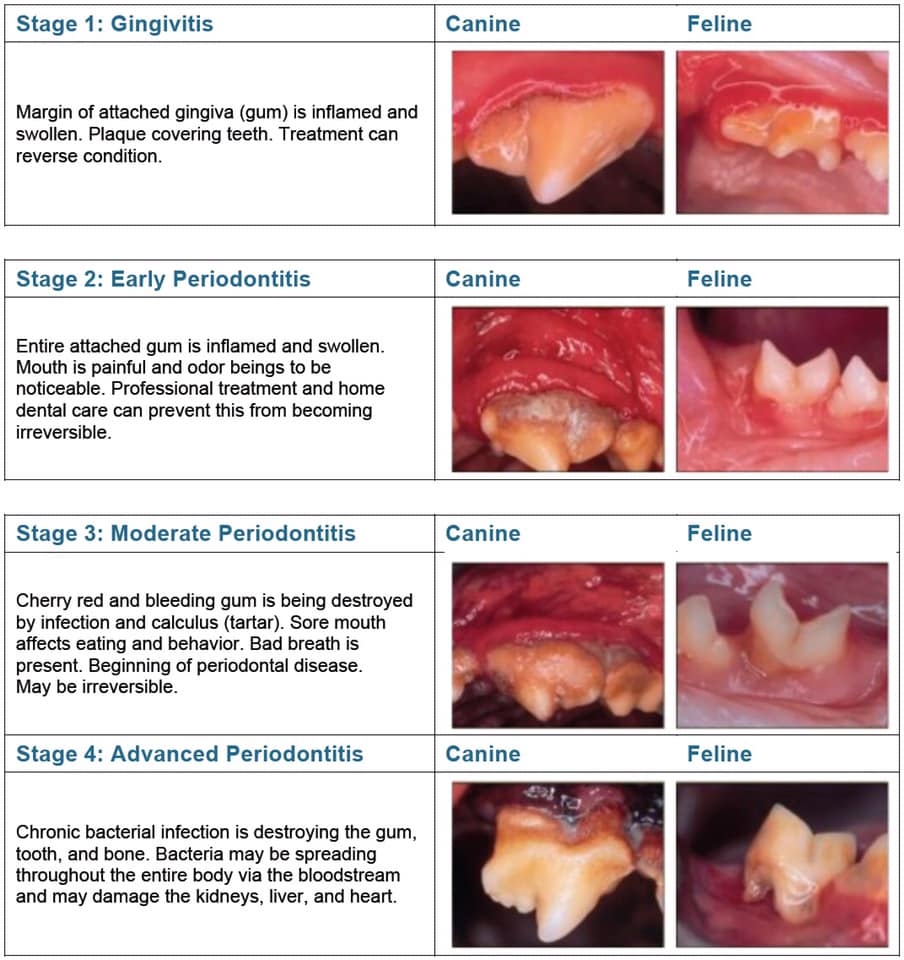Return to article List
AVOIDING DENTAL DISASTER!
The nitty gritty on dental health and your pet - Written by Dr. Michelle Eyre
“HALITOSIS”. A word many people haven’t heard, but something that many of your pets probably experience. It is the technical term for “bad breath”. By 2 years of age, a whopping 80% of dogs and 70% of cats will have some form of periodontal disease, which is infection and inflammation of the tissues that surround and support the teeth, and this in turn leads to halitosis. Small and toy breed dogs (Maltese, Lhasa Apso, Shih-Tzu, Poodles, Daschunds, Chihuahua, Schnauzers etc) are particularly susceptible.
Plaque that remains on the tooth surface for more than 3 days mineralizes to form calculus that cannot be removed by brushing. This leads to gingivitis (inflammation of the gums), and then to periodontal disease (infection and inflammation of the tissues supporting the teeth), which often leads to teeth having to be removed. What this means, is that we should be doing regular, daily cleaning of our dog’s teeth, just like we do for our own.
Daily tooth-brushing can commence at any age, but it is particularly easy to start when our puppies are young and easy to train. Special Veterinary toothbrushes, and finger brushes, can be purchased, but a soft baby’s toothbrush will also suffice. A special Veterinary enzymatic toothpaste must be used rather than human toothpaste, as it is not safe for dogs to swallow human toothpaste. If you have an older dog, and would like to take up tooth-brushing for them, this is certainly still a great idea - we will often just recommend a scale and polish first to get their teeth back to a clean slate, as hardened calculus is not able to be removed by tooth-brushing. Please click on the link below to be taken to a video on our Facebook page of Vet Michelle showing you how easy it is to brush your dog’s teeth with her adorable Schnauzer puppy Billie.
https://fb.watch/4yeDtzEwaG/
Brushing your pet’s teeth is the very best thing you can do to prevent calculus formation, and the follow-on effects of gingivitis and periodontal disease but in some cases it is not overly easy (for example if your Chihuahua exercises his best piranha impression when you go near his mouth!). In these cases, we recommend a few products that slow or prevent the attachment of plaque and calculus formation. Foods such as Hills Prescription Diet T/D and Royal Canin Dental diet, and dental treats such as Canine Greenies and C.E.T Veggiedents, if fed regularly, can help to control plaque and calculus. There are also water additives, such as Aquadent, that can freshen breath and aid in control of plaque. All of these products can be purchased over the counter in our front reception area. The Veterinary Oral Health Council website (www.vohc.org) provides further information about products that meet certain requirements for plaque and/or calculus control.
So, if your pet is suffering from HALITOSIS, please don’t let them suffer in silence! Come in and see us, and we will help you get their teeth back in tip-top condition!

Return to article List